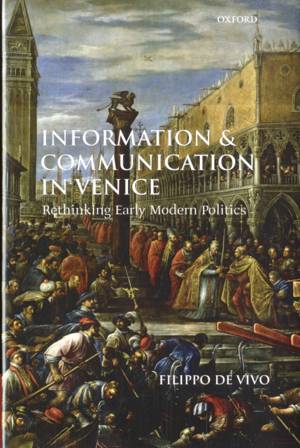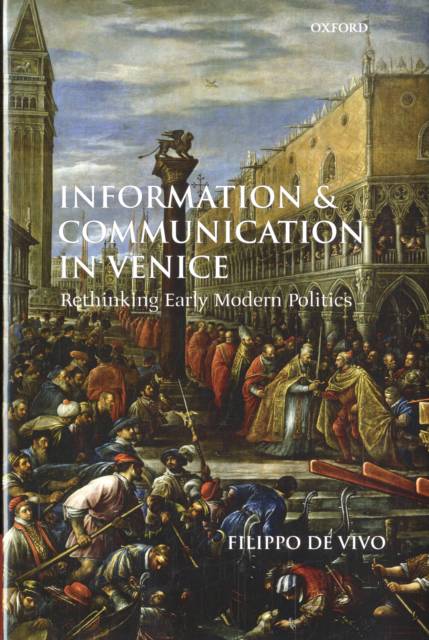
- Retrait gratuit dans votre magasin Club
- 7.000.000 titres dans notre catalogue
- Payer en toute sécurité
- Toujours un magasin près de chez vous
- Retrait gratuit dans votre magasin Club
- 7.000.000 titres dans notre catalogue
- Payer en toute sécurité
- Toujours un magasin près de chez vous
Information and Communication in Venice
Rethinking Early Modern Politics
Filippo de Vivo
Livre relié | Anglais
157,95 €
+ 315 points
Format
Description
This is a unique investigation of the political uses of different forms of communication - oral, manuscript, and printed - in sixteenth and seventeenth century Venice. De Vivo uses a rich and diverse range of sources - from council debates to leaks and spies' reports, from printed pamphlets to graffiti and rumors - to demonstrate just how closely political communication was intertwined with the wider social and economic life of the city. The book also engages with important wider problems, inviting comparison beyond Venice. For instance, today we take it for granted that communication and politics influence each other through spin-doctoring and media power. What, however, was the use of communication in an age when rulers recognized no political role for their subjects? And what access to political information did those excluded from government have?
In answering these questions, de Vivo offers a highly original reinterpretation of early modern politics that steers a course between the tendency of the political historian to view events from the windows of government buildings and the 'history from below' of social historians. As this account shows, neither perspective is sufficient in isolation, because even the most secretive oligarchs, ensconced in the Ducal Palace's most restricted councils, were constantly preoccupied by their vociferous subjects in the squares below. Challenging the social and cultural boundaries of more traditional accounts, the book goes on to show how politics in early modern Venice extended far beyond the patrician elite to involve the entire population, from humble clerks and foreign spies, to notaries, artisans, barbers, and prostitutes.
In answering these questions, de Vivo offers a highly original reinterpretation of early modern politics that steers a course between the tendency of the political historian to view events from the windows of government buildings and the 'history from below' of social historians. As this account shows, neither perspective is sufficient in isolation, because even the most secretive oligarchs, ensconced in the Ducal Palace's most restricted councils, were constantly preoccupied by their vociferous subjects in the squares below. Challenging the social and cultural boundaries of more traditional accounts, the book goes on to show how politics in early modern Venice extended far beyond the patrician elite to involve the entire population, from humble clerks and foreign spies, to notaries, artisans, barbers, and prostitutes.
Spécifications
Parties prenantes
- Auteur(s) :
- Editeur:
Contenu
- Nombre de pages :
- 328
- Langue:
- Anglais
Caractéristiques
- EAN:
- 9780199227068
- Date de parution :
- 07-12-07
- Format:
- Livre relié
- Format numérique:
- Genaaid
- Dimensions :
- 156 mm x 234 mm
- Poids :
- 635 g







